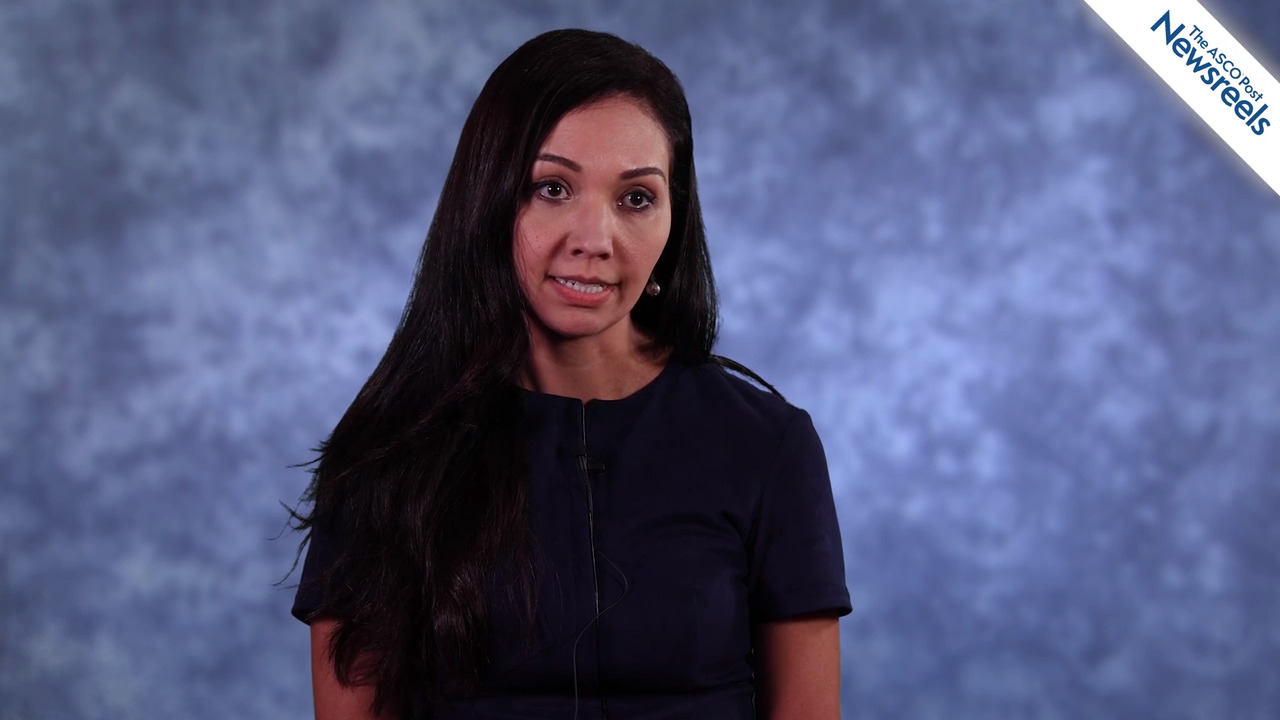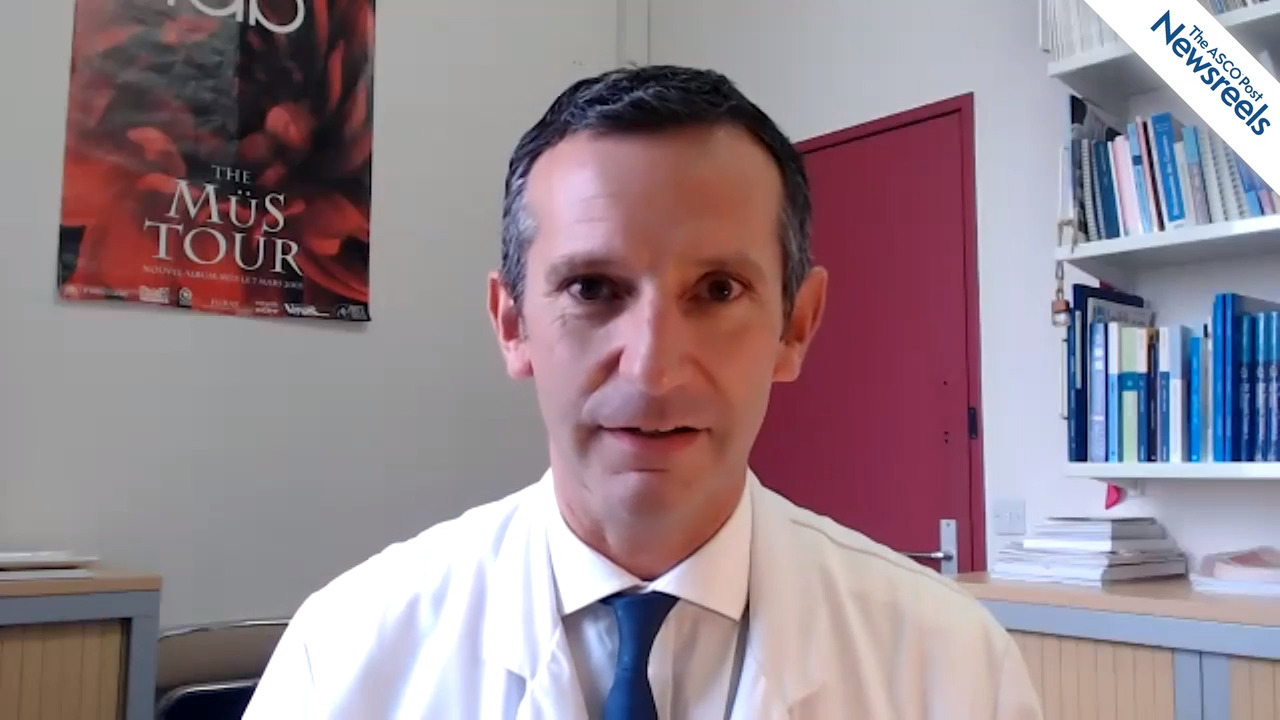Can Inhibition of the Aurora Kinase A Protein Help Overcome Resistance to KRAS Inhibition in Patients With Lung Cancer?
In preclinical models, combining an investigational Aurora kinase A (AURKA) inhibitor with a KRAS inhibitor or a WEE1 inhibitor showed efficacy against lung cancer cells with intrinsic or acquired resistance to KRAS inhibition, according to results presented by Lee et al at the AACR-NCI-EORTC...
FDA Approves Atezolizumab as Adjuvant Treatment for NSCLC
On October 15, the U.S. Food and Drug Administration (FDA) approved atezolizumab (Tecentriq) for adjuvant treatment following resection and platinum-based chemotherapy in patients with stage II to IIIA non–small cell lung cancer (NSCLC) whose tumors have PD-L1 expression on ≥ 1% of tumor cells, as...
Genomic Profiling of Lung Adenocarcinoma in Never-Smokers vs Smokers
In a study reported in the Journal of Clinical Oncology, Devarakonda et al found that never-smokers with lung adenocarcinoma had a high frequency of RTK/RAS/RAF pathway driver alterations—similar to smokers with lung adenocarcinoma—but also harbored a significantly higher total frequency of...
Neoadjuvant Atezolizumab Under Study in Mesothelioma
Neoadjuvant atezolizumab combined with pemetrexed and cisplatin, with maintenance atezolizumab, proved to be safe and feasible, offering a hint of benefit in patients with resectable pleural mesothelioma, in a small multicenter study presented at the International Association for the Study of Lung...
Expert Point of View: Charles M. Rudin, MD, PhD
Charles M. Rudin, MD, PhD, Hassenfeld Professor and Chief of the Thoracic Oncology Service, Memorial Sloan Kettering Cancer Center, commented that although ATLANTIS1 “unfortunately joins the ranks of negative phase III studies in patients with recurrent small cell lung cancer,” there are “some...
Benefits Seen With Lurbinectedin Plus Doxorubicin in Small Cell Lung Cancer—but Primary Endpoint Missed
As a second-line treatment for patients with small cell lung cancer, lurbinectedin plus doxorubicin failed to improve overall survival in the multicenter ATLANTIS trial but did provide other benefits, including better tolerability, researchers reported at the 2021 World Conference on Lung Cancer,...
Expert Point of View: Ichiro Yoshino, MD, PhD
Ichiro Yoshino, MD, PhD, Professor and Chairman of the Department of General Thoracic Surgery, Chiba University Graduate School of Medicine, Japan, reviewed the finer details of the IMpower010 exploratory analysis.1 He maintained that atezolizumab’s benefit does, indeed, seem to favor some patient...
IMpower010: Benefits Observed With Atezolizumab Regardless of Stage, Type of Prior Treatment
In an exploratory analysis of the pivotal phase III IMpower010 trial in stage II–IIIA non–small cell lung cancer (NSCLC), continued treatment with the monoclonal antibody atezolizumab after surgery and chemotherapy improved disease-free survival regardless of the type of surgery or chemotherapy...
Study Finds Medicaid Expansion May Be Associated With Decrease in Early Lung Cancer Mortality
Medicare expansion under the Affordable Care Act may have improved outcomes for patients with lung cancer, the leading cause of cancer death in the United States, according to data presented at the 2021 ASCO Quality Care Symposium.1 The National Cancer Database analysis of nearly 12,000 patients...
Jyoti Patel, MD, Offers Thoughts on Maintenance Durvalumab Utilization
Study discussant Jyoti Patel, MD, Medical Director of Thoracic Oncology and Assistant Director for Clinical Research at the Lurie Cancer Center of Northwestern University, Chicago, called the research “important for many reasons.” Although the study analyzed data from both open and closed claims,...
Maintenance Durvalumab: Increased Utilization May Improve Outcomes in NSCLC
Maintenance durvalumab, the standard-of-care treatment for patients with unresectable stage III non–small cell lung cancer (NSCLC), remains significantly underutilized, according to data presented at the International Association for the Study of Lung Cancer (IASLC) 2021 World Conference on Lung...
Black Patients With Advanced NSCLC Receiving Immunotherapy May Have a Lower Risk of Death Than White Patients
Collectively, Black Americans have the highest death rate and shortest survival of any racial/ethnic group in the United States for most cancers; Black men also have the highest cancer incidence rate. Despite improvements in survival disparities between Black and White Americans in specific cancers ...
Adjuvant Atezolizumab Following Adjuvant Chemotherapy for Resected Stage IB to IIIA NSCLC
In the phase III IMpower010 trial reported in The Lancet, Enriqueta Felip, MD, and colleagues found that the use of adjuvant atezolizumab after adjuvant platinum-based chemotherapy significantly improved disease-free survival vs best supportive care in patients with resected stage II to IIIA...
Two Studies Show Health-Care Costs May Impact Follow-up Care After Cancer Screening
Eleven years ago this month, the scans and exams that hold the most power to spot the early signs of cancer became available for free to many American adults through the passing of the Affordable Care Act. Now, two new studies show that when those screening tests reveal potentially troubling signs, ...
Leticia Nogueira, PhD, MPH, on the Association of Medicaid Expansion and Early Mortality Following Lung Cancer Surgery
Leticia Nogueira, PhD, MPH, of the American Cancer Society, discusses results from a study designed to evaluate the impact of Medicaid expansion under the Affordable Care Act (ACA). In Medicaid-expansion states, mortality among patients after lung cancer surgery decreased from 2.4% before the ACA to 0.8% after the ACA, with no significant change in non–Medicaid-expansion states.
Poziotinib, a Tyrosine Kinase Inhibitor, for HER2 Exon 20–Mutant NSCLC
In a single-center phase II trial reported in the Journal of Clinical Oncology, Elamin et al found that the tyrosine kinase inhibitor poziotinib showed activity in previously treated patients with HER2 exon 20–mutant advanced non–small cell lung cancer (NSCLC). As related by the investigators,...
Nasser K. Altorki, MD, on NSCLC: Adjuvant Atezolizumab for Stage IB–IIIA Disease
Nasser K. Altorki, MD, of Weill Medical College of Cornell University and NewYork-Presbyterian Hospital, discusses phase III data from the IMpower010 study, which showed that, compared with best supportive care, atezolizumab improved disease-free survival in patients with stage II–IIIA non–small cell lung cancer. These findings applied across most disease stages and most surgery types and chemotherapy regimens, as well as in patients with nodal involvement (Abstract PL02.05).
Classifying EGFR Mutations by Structure and Function May Help to Match Patients With NSCLC to More Effective Treatments
Researchers have discovered that grouping EGFR mutations by structure and function provides an accurate framework to match patients with non–small cell lung cancer (NSCLC) to the right drugs. The findings, published by Robichaux et al in Nature, identify four subgroups of mutations and introduce a...
Overall Survival With Stereotactic Ablative Radiotherapy for Operable Stage IA NSCLC
As reported in The Lancet Oncology by Chang et al, long-term results of the single-institution revised STARS trial indicate that overall survival in patients receiving stereotactic ablative radiotherapy (SABR) for operable stage IA non–small cell lung cancer (NSCLC) was noninferior to that in a...
Robin Cornelissen, MD, PhD, on HER2 Exon 20–Mutated NSCLC: Poziotinib in Treatment-Naive Disease
Robin Cornelissen, MD, PhD, of Erasmus University in Rotterdam, discusses phase II findings from the ZENITH20-4 study, which explored the question of whether poziotinib could benefit patients whose newly diagnosed non–small cell lung cancer harbors EGFR and HER2 exon 20 mutations. Potentially, this novel tyrosine kinase inhibitor may fill an unmet medical need (Abstract LBA46).
Patients First
By the time my non–small cell lung cancer was diagnosed in 2004, it had already reached stage IIIB, and I was told there was little that could be done for me. I was 56, a wife, the mother of 3 children, and at the peak of my career as president of Olympian Oil. Although my aunt, brother, and...
Benjamin Besse, MD, PhD, on NSCLC: A Vaccine Under Study to Treat Advanced Disease
Benjamin Besse, MD, PhD, of the Institut Gustave Roussy, discusses final phase III findings from the Atalante-1 trial, which explored the question of whether the OSE2101 vaccine is more beneficial than standard treatment for patients with HLA-A2–positive non–small cell lung cancer after immune checkpoint inhibitors are no longer effective (Abstract LBA47).
DESTINY-Lung01: Fam-trastuzumab Deruxtecan-nxki in Previously Treated HER2-Mutant NSCLC
In the phase II DESTINY-Lung01 trial, presented at the European Society for Medical Oncology (ESMO) Congress 2021 (Abstract LBA45) and concurrently reported in The New England Journal of Medicine, Bob T. Li, MD, PhD, MPH, and colleagues found that fam-trastuzumab deruxtecan-nxki produced durable...
Addition of Ramucirumab to Gemcitabine in Second-Line Treatment of Malignant Pleural Mesothelioma
In the Italian phase II RAMES trial reported in The Lancet Oncology, Pinto et al found that the addition of ramucirumab to gemcitabine improved overall survival in the second-line treatment of malignant pleural mesothelioma. As noted by the investigators, “There is a preclinical rationale for...
Expert Point of View: Mark G. Kris, MD, FASCO
Mark G. Kris, MD, FASCO, Chief of the Thoracic Oncology Service and the William and Joy Ruane Chair in Thoracic Oncology at Memorial Sloan Kettering Cancer Center, New York, commented on the excitement in the field of lung cancer about the new drugs targeting KRAS. Sotorasib is one of several new...
Sotorasib: Subgroup Analysis of Phase II Trial Shows Activity With KRAS Inhibitor in Lung Cancer
The KRAS-specific inhibitor sotorasib achieved responses in patients with KRAS G12C–mutated non–small lung cancer (NSCLC) who had experienced disease progression on platinum-based chemotherapy, immunotherapy, or both treatments. The objective response rate was 37.1%, and responses extended to all...
Atezolizumab Reduces Risk of Disease Progression in Patients With PD-L1–Expressing Early-Stage NSCLC
Atezolizumab given after chemotherapy to patients with resected stage II to IIIA non–small cell lung cancer (NSCLC) significantly improved disease-free survival compared with best supportive care alone in patients whose tumors expressed PD-L1.1 These results of the global phase III IMpower010 trial ...
EMPOWER-Lung 1: Cemiplimab-rwlc Improves Outcomes in First-Line Treatment of NSCLC With Brain Metastases
First-line treatment with cemiplimab-rwlc monotherapy improved overall survival, progression-free survival, and objective response rates compared with chemotherapy in patients with advanced non–small cell lung cancer (NSCLC) with PD-L1 expression of at least 50% and clinically stable treated brain...
Amivantamab/Lazertinib Combination May Overcome Osimertinib Resistance in Patients With EGFR-Positive NSCLC
Combination targeting of epidermal growth factor receptor (EGFR) with amivantamab/lazertinib achieved durable responses in more than one-third of chemotherapy-naive patients with EGFR-mutant non–small cell lung cancer (NSCLC) that had progressed on osimertinib, according to a cohort analysis of the ...
Atezolizumab Plus Chemotherapy in Patients With Advanced NSCLC and Brain Metastases
Patients with advanced non–small cell lung cancer (NSCLC) and brain metastases derived benefit from treatment with atezolizumab plus chemotherapy, according to findings from the multicenter phase II ATEZO-BRAIN/GECP 17/05 trial. The study was presented at the International Association for the Study ...
Almost Two-Thirds of Surveyed Thoracic Oncologists Reported Using Telehealth for the First Time During the COVID-19 Pandemic
Nearly two-thirds of thoracic oncologists surveyed indicated they used telehealth tools for the first time during the COVID-19 pandemic, according to a report issued by Baird et al at the International Association for the Study of Lung Cancer (IASLC) 2021 World Conference on Lung Cancer (Abstract...
Survey Examines Oncology Clinician Perceptions of Biomarker Testing for Underserved Patients With Lung Cancer
Less than half of community oncologists surveyed indicated that they use biomarker testing to guide patient discussions compared with 73% of academic clinicians, according to a report by Boehmer et al presented at the International Association for the Study of Lung Cancer (IASLC) 2021 World...
Prasad S. Adusumilli, MD, on CAR T-Cell Therapy for Mesothelioma
Prasad S. Adusumilli, MD, of Memorial Sloan Kettering Cancer Center, discusses phase I/II research he is conducting on CAR T cells delivered intrapleurally in patients with mesothelioma. The treatment is targeting mesothelin, a cancer cell-surface antigen overexpressed in many solid tumors and associated with aggressive disease (Abstract PL05.01).
Jamie L. Studts, PhD, on The Stigma of Lung Cancer: It’s Time to Eliminate It
Jamie L. Studts, PhD, of the University of Colorado School of Medicine, discusses data that show the stigma surrounding lung cancer hinders optimal patient care. This information stems from a campaign launched by the National Lung Cancer Roundtable to eliminate this stigma and offer a range of initiatives that could alter societal perspectives (Abstract PL04.02).
Neoadjuvant Atezolizumab Under Study for Resectable Pleural Mesothelioma
Neoadjuvant atezolizumab combined with pemetrexed and cisplatin, followed by surgical resection and maintenance atezolizumab, proved safe and feasible and offered hints of benefit in patients with resectable pleural mesothelioma. Results from a small multicenter study were presented by Boris...
Maintenance Durvalumab: Increased Utilization Could Improve NSCLC Outcomes
Maintenance durvalumab—the recommended maintenance treatment for patients with unresectable stage III non–small cell lung cancer (NSCLC) following chemoradiation—remains significantly underutilized, according to research presented by Liu et al at the International Association for the Study of Lung...
POSEIDON Trial: Dual Checkpoint Blockade Plus Chemotherapy Improves Survival in First-Line Metastatic NSCLC
Findings from the phase III POSEIDON trial showed significantly improved progression-free and overall survival in patients with metastatic non–small cell lung cancer (NSCLC) who received first-line durvalumab and tremelimumab plus chemotherapy vs chemotherapy alone. These findings were presented by ...
IMpower010 Study of Atezolizumab in Resectable NSCLC: Benefits Observed Regardless of Stage, Type of Prior Treatment
In an exploratory analysis of the pivotal phase III IMpower010 trial—which found that adjuvant atezolizumab significantly improved disease-free survival in resectable non–small cell lung cancer (NSCLC)—benefit was shown regardless of the type of surgery or the chemotherapy doublet received by the...
No Overall Survival Benefit With Lurbinectedin/Doxorubicin in Small Cell Lung Cancer
As a second-line treatment for patients with small cell lung cancer (SCLC), lurbinectedin plus doxorubicin failed to improve overall survival in the multicenter ATLANTIS trial, but it did provide other benefits, Luis Paz-Ares, MD, PhD, and colleagues reported at the International Association for...
Christine D. Berg, MD, on Lung Cancer Deaths Attributable to Air Pollution: Global Variability
Christine D. Berg, MD, of the National Cancer Institute, discusses air pollution as a carcinogen that disproportionately affects poorer, overburdened communities and the elderly and frail—especially in countries where smoking rates are high and the use of coal predominates. Clinicians, Dr. Berg says, can help their patients by advocating for switching to clean energy and transportation and helping health-care facilities become more sustainable (Abstract PL02.07).
Amivantamab-vmjw for Previously Treated Advanced NSCLC With EGFR Mutation
On May 21, 2021, amivantamab-vmjw, a bispecific antibody directed against EGFR and MET receptors, was granted accelerated approval for treatment of adults with locally advanced or metastatic non–small cell lung cancer (NSCLC) with EGFR exon 20 insertion mutations, as detected by a U.S. Food and...
Alex A. Adjei, MD, PhD, on Disparities in Lung Cancer Care: The Global Burden
Alex A. Adjei, MD, PhD, of the Mayo Clinic, talks about the fact that despite strides in lung cancer treatment, more than 60% of the world’s patients with the disease are in countries with relatively scarce medical resources, where less than 50% of patients are screened. There is a great need, says Dr. Adjei, to focus on ways to reduce disparities and remove the barriers of cost, access, quality, and lack of awareness (Abstract PL01.03).
Matthew Smeltzer, PhD, on International Lung Cancer Clinical Trials: The Impact of COVID-19
Matthew Smeltzer, PhD, of the University of Memphis, discusses a study of 171 trials in 45 countries that saw reduced enrollment as a result of the COVID-19 pandemic. Among the recommended steps to remove barriers and improve participation are more flexibility in allowing telehealth visits with researchers as well as clinicians, local lab testing and scans, altering trial schedules, and mailing experimental agents to patients whenever possible (Abstract PL02.09).
IASLC 2021: Single-Center Study Examines Psychological Impact of the COVID-19 Pandemic on Patients With Lung Cancer
Patients coping with lung cancer treated at one hospital in Mexico reported high levels of anxiety and saw their treatment delayed due to the COVID-19 pandemic, according to a study presented by Oscar Arrieta, MD, at the 2021 International Association for the Study of Lung Cancer (IASLC) World...
IASLC 2021: Enrollment in Clinical Trials for Lung Cancer Declined Significantly During the COVID-19 Pandemic
Enrollment in lung cancer clinical trials declined by 43% during the COVID-19 pandemic, according to research presented by Smeltzer et al at the International Association for the Study of Lung Cancer (IASLC) 2021 World Conference on Lung Cancer (Abstract PL02.09). IASLC Survey To assess the impact...
IASLC 2021: Study Examines Global Risk of Lung Cancer Due to Air Pollution
Five European countries rank highest for lung cancer risk attributable to air pollution among those aged 50 to 69 years, according to research presented by Berg et al in the Presidential Symposium Plenary Session at the International Association for the Study of Lung Cancer (IASLC) 2021 World...
Genomic Analysis of Lung Cancer in Never-Smokers
A genomic analysis of lung cancer in people with no history of smoking has found that a majority of these tumors arise from the accumulation of mutations caused by natural processes in the body. This study was conducted by an international team led by researchers at the National Cancer Institute...
Several Studies Show Rovalpituzumab Tesirine Is Ineffective Against SCLC
Four independent studies published in the Journal of Thoracic Oncology demonstrate that rovalpituzumab tesirine (Rova-T), a first-in-class antibody-drug conjugate directed against delta-like protein 3 (DLL3), is not effective against small cell lung cancer (SCLC). An accompanying editorial by...
Ensartinib Shows Superior Efficacy to Crizotinib in Advanced ALK-Positive NSCLC: eXalt3 Trial
As reported in JAMA Oncology by Leora Horn, MD, MSc, FRCPC, and colleagues, the phase III eXalt3 trial has shown significantly prolonged progression-free survival with ensartinib vs crizotinib in patients with advanced, recurrent, or metastatic anaplastic lymphoma kinase (ALK)-positive non–small...
Study Highlights Gaps Between Lung Cancer Treatment Recommendations and Real-World Use of Durvalumab
A recent study published by Ronden et al in JTO Clinical and Research Reports highlights the gap between treatment guidelines and real-world care with the monoclonal antibody durvalumab for patients with non–small cell lung cancer. Researchers studied treatment decision-making by three Dutch...









